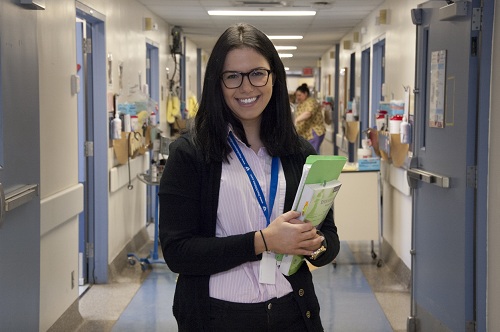The bright mind and curious spirit of young researcher Constantina Boikos

Constantina Boikos is a PhD Epidemiology candidate working in the field of Public Health at the Research Institute of the McGill University Health Centre (RI-MUHC). Insatiably curious, she is always searching for new angles to approach her research. Her current project focuses on the effects of an intranasal influenza vaccine in children with cystic fibrosis.
"The regular flu vaccine most people receive, including children, is given as a shot in the arm and only contains parts of the virus," Boikos explains. "The vaccine I study, called Flumist, is given as a spray in the nose and mimics the natural influenza virus. It's been already proven to be more effective in children. I look at the inflammatory response to this vaccine and at possible adverse events in kids with cystic fibrosis. These go from serious events requiring hospitalizations, scheduled or unscheduled medical visits and prescriptions of antibiotics to minor reactions such as a cough or a runny nose."
One of the motivating aspects of her work is the fact that her study findings can be immediately translated into health policies.
"My research will contribute to the body of evidence that may sway the National Advisory Committee on Immunization to recommend this intranasal vaccine for kids with cystic fibrosis," she explains.
Boikos is working under the supervision of RI-MUHC researchers Dr. Lawrence Joseph, biostatistician, and Dr. Caroline Quach, infectious diseases consultant, microbiologist and co-director of the Vaccine Study Centre at the Montreal Children's Hospital (MCH).
"It's important to develop a good network and to keep close ties with your supervisors," she says. "I also enjoy the interdisciplinary aspect of my job. In my thesis committee, for instance, we have a pulmonologist, a biostatistician, a virologist and a pediatrician."
A love of "all things microscopic" led Boikos to earn a bachelor's degree in Microbiology and Immunology.
"The microscopic world is fascinating and beautiful. There's an entire universe of things that we can't see that govern so much of our lives. Just think of the impact of outbreaks on our civilization, like the bubonic plague in the Middle Ages and the plague of Justinian in Roman times, or, more recently, the H1N1 and Ebola outbreaks."
Boikos believes advanced technologies, streamlined publication processes and easier access to information raise the expectations of excellence for her generation.
"I don't think we're particularly more apt to contribute to science than previous generations, but we do have a great deal of information at our fingertips and whole libraries at the click of a button. I would encourage young people to be curious. They can get a good scope of what's out there in our field and go from there. It will keep them motivated throughout their career and their life."
Although she is thriving in the Research Institute, Boikos doesn't yet know what direction she'd like her career to take in the next 10 to 20 years.
"I'd definitely like to finish my PhD on time in about two years, and then, the sky is the limit," she says with a smile.
Constantina also appears in a video recently made by the Fonds de recherche du Québec – Santé on Canal Savoir, where she talks about her exciting work and shares her passion for science! Click here to watch the video (mainly in French, but the interview with Constanina is in English).